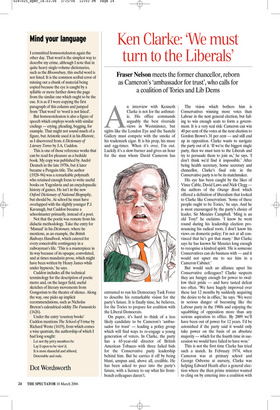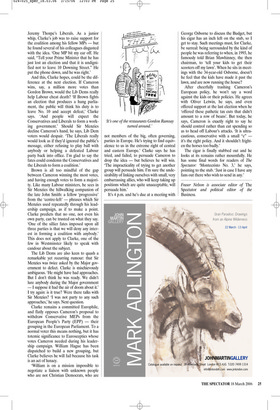Ken Clarke: ‘We must turn to the Liberals’
Fraser Nelson meets the former chancellor, reborn as Cameron’s ‘ambassador for trust’, who calls for a coalition of Tories and Lib Dems An interview with Kenneth Clarke is not for the asthmatic. His office commands arguably the best riverside views in Westminster, but sights like the London Eye and the Saatchi Gallery must compete with the smoke of his trademark cigar. It is his prop, his muse and egg-timer. When it’s over, I’m out.
Luckily it’s a slow-burner and gives an hour for the man whom David Cameron has entrusted to run his Democracy Task Force to describe his remarkable vision for the party’s future. It is finally time, he believes, for the Tories to prepare for coalition with the Liberal Democrats.
On paper, it’s hard to think of a less likely candidate to be Cameron’s ‘ambassador for trust’ — leading a policy group which will find ways to re-engage a young generation of voters. In Clarke, the party has a 65-year-old director of British American Tobacco with three failed bids for the Conservative party leadership behind him. But he carries it off by being blunt, unspun and, above all, credible. He has been asked to peer into the party’s future, with a licence to say what his frontbench colleagues daren’t. The vision which bothers him is Conservatives winning more votes than Labour in the next general election, but failing to win enough seats to form a government. It is a very real risk: Cameron can win 40 per cent of the votes at the next election to Gordon Brown’s 31 per cent — and still end up in opposition. Clarke wants to navigate the party out of it. ‘If we’re the biggest single party, then we must turn to the Liberals and try to persuade them to join us,’ he says. ‘I don’t think we’d find it impossible.’ After being health secretary, home secretary and chancellor, Clarke’s final role in the Conservative party is to be its matchmaker.
His eye has been caught by the likes of Vince Cable, David Laws and Nick Clegg the authors of the Orange Book which offered a definition of liberalism that looked to Clarke like Conservatism. ‘Some of these people ought to be Tories,’ he says. And he is most encouraged by the party’s choice of leader, Sir Menzies Campbell. ‘Ming is an old Tory!’ he exclaims. ‘I know he went round during his leadership election pronouncing his radical roots. I don’t know his views on domestic policy; I’m not at all convinced that he’s got that many.’ But Clarke says he has known Sir Menzies long enough to recognise a kindred spirit. ‘He is someone Conservatives can do business with — and it would not upset me to see him in a Cameron Cabinet.’ But would such an alliance upset his Conservative colleagues? Clarke suspects they are hungry enough for power to swallow their pride — and have tasted defeat too often. ‘We have hugely improved over these last 12 months by suddenly acquiring the desire to be in office,’ he says. ‘We were in serious danger of becoming like the Labour party in the 1980s and enjoying the squabbling of opposition more than any serious aspiration to office. By 2009 we’ll have been out of power for 12 years. I’d be astonished if the party said it would only take power on the basis of an absolute majority — which for the fourth time in succession we would have failed to have won.’ This is not the first time Clarke has tried such a match. In February 1974, when Cameron was at primary school and George Osborne at nursery, Clarke was helping Edward Heath after a general election where the then prime minister wanted to cling on by entering into a coalition with Jeremy Thorpe’s Liberals. As a junior whip, Clarke’s job was to raise support for the coalition among his fellow MPs — but he found several of his colleagues disgusted with the idea. ‘One MP bit my ear off. He said, “Tell your Prime Minister that he has just lost an election and that it is undignified not to leave 10 Downing Street.” He put the phone down, and he was right.’ And this, Clarke hopes, could be the difference at the next election. If Cameron wins, say, a million more votes than Gordon Brown, would the Lib Dems really help Labour cheat death? ‘If Brown fights an election that produces a hung parliament, the public will think his duty is to leave No. 10 and accept defeat,’ Clarke says. ‘And people will expect the Conservatives and Liberals to form a working government.’ Should Sir Menzies decline Cameron’s hand, he says, Lib Dem voters would despair. ‘The Liberals really would look as if they’d ignored the public’s message, either refusing to play ball with anybody or helping a defeated Labour party back into office. I’m glad to say the fates could condemn the Conservatives and the Liberals to form a coalition.’ Brown is all too mindful of the gap between Cameron winning the most votes, and having enough votes to form a majority. Like many Labour ministers, he sees in Sir Menzies the hillwalking companion of the late John Smith: a fellow ‘progressive’ from the ‘centre-left’ — phrases which Sir Menzies used repeatedly through his leadership campaign, as if to make a point. Clarke predicts that no one, not even his own party, can be trusted on what they say. ‘One of the sillier fates imposed upon all three parties is that we will deny any interest in forming a coalition with anybody.’ This does not apply to Clarke, one of the few in Westminster likely to speak with candour about the subject.
The Lib Dems are also keen to quash a remarkable yet recurring rumour: that Sir Menzies was twice asked by the Major government to defect. Clarke is mischievously ambiguous. ‘He might have had approaches. But I don’t think he was ready. We didn’t lure anybody during the Major government — I suppose it had the air of doom about it.’ I try again: is it true? Were there talks with Sir Menzies? ‘I was not party to any such approaches,’ he says. Next question.
Clarke remains a committed Europhile, and flatly opposes Cameron’s proposal to withdraw Conservative MEPs from the European People’s Party (EPP) — their grouping in the European Parliament. To a normal voter this means nothing, but it has totemic significance to Eurosceptics whose votes Cameron needed during his leadership campaign. William Hague has been dispatched to build a new grouping, but Clarke believes he will fail because his task is an act of lunacy.
‘William is on a mission impossible to negotiate a liaison with unknown people who are not Christian Democrats, who are not members of the big, often governing, parties in Europe. He’s trying to find equivalence to us in the extreme right of central and eastern Europe.’ Clarke says he has tried, and failed, to persuade Cameron to drop the idea — but believes he will win. ‘The impracticality of trying to get another group will persuade him. I’m sure the undesirability of linking ourselves with small, very embarrassing allies, who will keep taking up positions which are quite unacceptable, will persuade him.’ It’s 4 p.m. and he’s due at a meeting with George Osborne to discuss the Budget, but his cigar has an inch left on the stub, so I get to stay. Such meetings must, for Clarke, be surreal: being surrounded by the kind of people he was referring to when, in 1993, he famously told Brian Mawhinney, the then chairman, to ‘tell your kids to get their scooters off my lawn’. When he sits in meetings with the 34-year-old Osborne, doesn’t he feel that the kids have made it past the lawn, and are now running the house?
After cheerfully trashing Cameron’s European policy, he won’t say a word against the kids or their policies. He agrees with Oliver Letwin, he says, and even offered support at the last election when he ‘offered these pathetic tax cuts that didn’t amount to a row of beans’. But today, he says, Cameron is exactly right to say he should control rather than cut spending so as to head off Labour’s attacks. ‘It is ultracautious, conservative with a small “c” — it’s the right policy. And it shouldn’t frighten the horses too badly.’ The cigar is finally stubbed out and he looks at its remains rather mournfully. He has some final words for readers of The Spectator: ‘Montecristo No. 3,’ he says, pointing to the stub. ‘Just in case I have any fans out there who wish to send in any.’



















































































 Previous page
Previous page